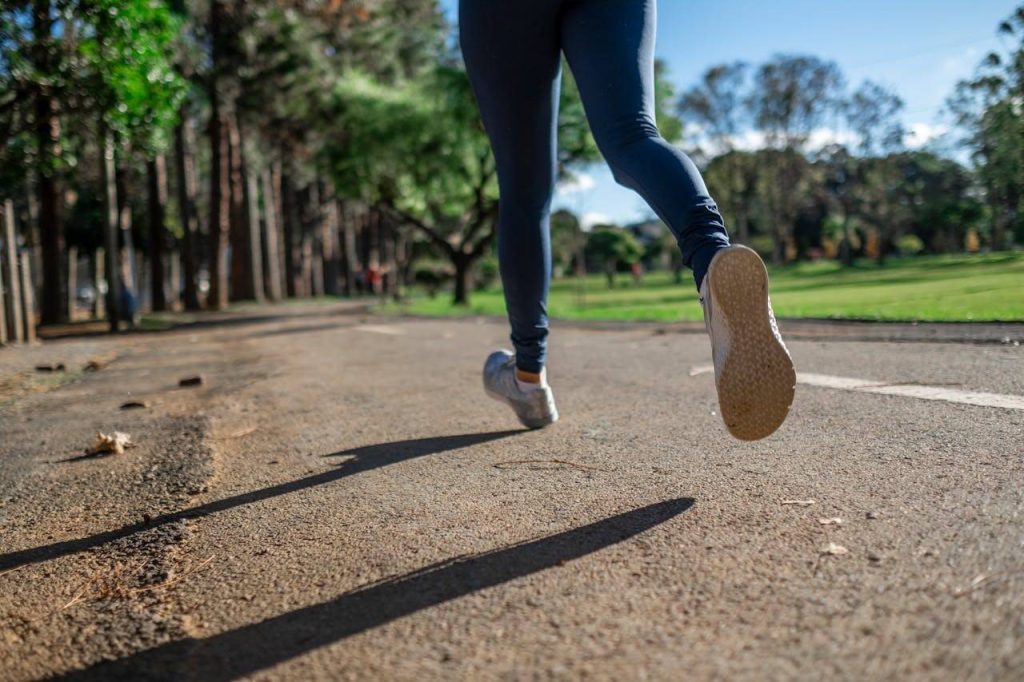Running is a popular exercise that’s popular among people especially for younger people to stay healthy and get fit with a lot of health benefits. Running is simple and all you need is a pair of running shoes. Whether you’ve been exercising for years or you’re a beginner in fitness line, running can give you lots of health benefits.

In this comprehensive, we will walk through one of the main important Physical activities i.e., Running. Starting from Running, we will cover the topics like What is Running, Running Health Benefits, how to get better with Running, etc. Let’s come along with us and explore the concept of Running!
Contents
What is Running?
Running is when you move quickly on foot. It’s faster than walking but not as fast as sprinting. The difference between walking and running is that when you walk, one foot is always touching the ground. But when you run, there’s a point where both your feet are in the air. That’s why running is considered a high-impact activity.
Running is something humans naturally do so almost anyone can do it. Whether you’re just enjoying a slow jog in the park or competing in a marathon, running can change your personal fitness level and goals.
What are the Running Health Benefits?
Running is a natural Physical activity that can give you fitness and other health benefits, both for your body and your mind, just like most exercises.
Let’s highlight some of the benefits that play an important role in running:
1. A study from 2018 showed that just 15 minutes of running can make you feel better and more energetic. The people in the study felt even better from running than they did from things like meditation, deep breathing, relaxing their muscles, or imagining peaceful scenes.
2. One of the benefits of running is that it makes the heart stronger and better at moving blood and oxygen all over the body. If you make a habit of running every day, it can lower your chances of getting heart disease, having a stroke, or getting high blood pressure.
3. According to The Ohio State University Wexner Medical Center in Columbus, running is good for your mind and your heart. It helps your heart and lungs work better because they get more oxygen and blood.
4. Running is a great way to burn calories, which can help you lose weight and keep it off. It also speeds up your metabolism, which helps you keep a healthy weight in the long run.
5. A study from 2020 found that the more you run, no matter how often, the less likely you are to die from heart-related problems.
6. Running makes your body release endorphins, which are chemicals that make you feel happy and less stressed or anxious. It also helps you think better, focus more, and make your mind clearer.
7. A study in 2021 looked at runners aged 40 to 85. They checked their bone strength with scans at the start and again about 10 years later. The people who kept running regularly kept their bones strong, and some even got stronger bones over time. But the people who stopped training as much saw their bone health get worse.
8. According to the decade of running history, running can be good for your bones and joints if you do it right. It can make your bones stronger and your joints more stable, which can lower your chances of getting osteoporosis and arthritis.
9. Dr. Walrod explains that running can help control your blood pressure, blood sugar, and body weight. Also, if running helps you reach the suggested goal of 150 minutes of physical activity per week, you could lower your risk of certain cancers, heart disease, and type 2 diabetes.
10. Based on research from 2017, people who run regularly have a 25 to 40 percent lower chance of dying early, and they tend to live about three years longer than those who don’t run.
Starting with a short 10-minute run a few times a week can improve your health. If you increase your running time by about 10 percent each week, you can enhance these benefits significantly without a higher risk of getting hurt.
Try Our Best Weight Loss Supplement

| Product: | Puravive |
| Reviewed By: | Dr. Roman Off |
| Ingredients: | 8 Natural Ingredients |
| Side Effects: | None |
| Price: | $69 |
| Rating and Reviews: | ⭐️⭐️⭐️⭐️⭐️ 4.3/5.0 |
| Official Website | https://puravive.com |
How to Start Running?

It is recommended to consult with a doctor before you start any workout routine, especially if you have any health issues or are on medicine. Make sure to get a pair of running shoes that fit well and give your feet and your running form the right balance and comfort. Start with a mix of walking and running, and as you get fitter, slowly increase how long and how far you run.
Start with small and easily achievable goals, like running a certain distance or joining a local race. How long and far you run will depend on how fit you are, but you should slowly increase both over time. Running will be harder than walking, but overall, you should feel like you’re going at a relaxed pace.
The goal is to get to a point where you can run comfortably for at least 15 minutes a few times a week. Once you reach that, you might want to follow a training plan to keep improving.
How to Get More out of a Running Workout?
To get the most out of your running workout, it is important to pay attention to how hard you’re working, mix things up, and make sure you’re running correctly. Use interval training to push your heart and lungs and get faster and stronger. Run on different surfaces to work out different muscles and get stronger overall.
Keep an eye on how you’re running, making sure you’re standing tall and your steps are smooth. Drink plenty of water, eat right, and pay attention to what your body is telling you to avoid getting hurt and do your best. Lastly, keep track of how you’re doing and celebrate your wins to keep yourself excited and inspired.
How to Get Better at Running?
First of all, to improve the running process, you need to run every day. Start by running a little bit more and a little bit faster each time, but don’t overdo it. Do workouts that build your muscles to help prevent injuries. Watch how you run and how you breathe, and pay attention to how your feet touch the ground.
Make goals that you can reach and keep track of how you’re doing to keep your spirits up. Lastly, change your running routine by doing different kinds of runs like quick bursts, uphill, and long ones to keep pushing yourself and keep getting better.
What Nutrition Tips for Runners?

When you begin running, finding the right balance with your food intake is crucial. If you eat too few calories, you might run out of energy early during your run. On the other hand, consuming too much food can lead to issues like bloating or stomach discomfort. So, aim for a balanced diet that provides enough energy without overdoing it.
A lot of people find that they have more stomach problems when they run compared to doing other exercises. This can be due to several reasons, including how running works — it gets more blood flowing in your body, which can mess with your digestion and make you go to the bathroom faster.
Eating too much fiber, fat, or protein too close to your run, can lead to stomach pain. It’s essential to choose your pre-run meals wisely to avoid discomfort during your exercise.
Choosing what to eat before, during, and after a run is a personal decision that requires some trial. According to data, many people try different food options and maintain a log of what they ate and how their run went. This helps them identify the best pre-run and post-run snacks for their individual needs.
If you’ve had a large meal, it’s best to wait at least two to four hours before going for a run. For a snack, wait one to two hours. This timing helps ensure you have enough energy without feeling uncomfortable during your run.
FAQs
Do I need to warm up before my run? How?
Before running, a proper warm-up is essential. Start doing exercises that imitate running movements. These exercises help warm up your muscles and joints. Some examples include light hops on both legs, single-leg hops, walking lunges, and squat jumps.
How many calories does running burn?
How many calories you burn depends on things like how fit you are now, how much you weigh, how old you are, and how hard you work out. For example, the American Council on Exercise (ACE) has a tool that counts calories burned during physical activity. According to this tool, if you weigh 150 pounds and run three miles at a speed that lets you finish each mile in 10 minutes, you will burn around 340 calories.
What muscles do you use for running?
When you run, you mainly use your buttocks, back of your thighs, front of your thighs, hip flexors, calf muscles, and stomach muscles. But since you also move your arms and upper body when you run, your shoulders and back muscles get a bit of a workout too.

Dr. Roman Off is a multi-talented professional with expertise in psychology, nutrition, and content writing. She has a Doctorate in Clinical Psychology and is a psychologist with several years of experience helping individuals overcome mental health issues. In addition, Dr. Roman Off is a dietitian and nutritionist, specializing in helping clients achieve optimal health through proper nutrition and lifestyle changes.









